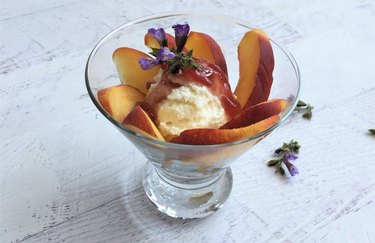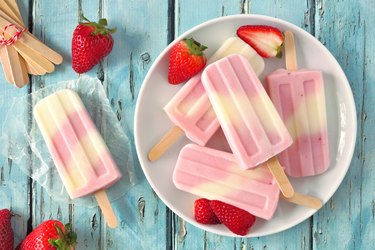
When the temperatures rise, nothing tastes better than a cold, refreshing dessert. But the trouble with many summertime sweets is that they're, well, really sweet.
Treats such as ice cream and frozen yogurt are high in added sugars and sometimes high in saturated fat as well — which translates to taking in more calories without getting those beneficial nutrients.
Video of the Day
Video of the Day
But all is not lost. Enter: low-calorie fruit desserts. From watermelon to strawberries and peaches, we have your summer fruit favorites covered with these six easy-to-make treats all under 200 calories a serving.
1. Watermelon Fruit Pizza
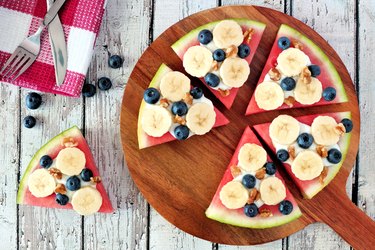
- Calories: 44
Watermelon is synonymous with summer. Slices of the melon are cold and juicy — everything you need in summer fruit.
When temps rise, we sweat more, which means our water needs go up. Foods like watermelon, provide about 20 percent of our fluid needs, according to the International Food Information Council Foundation. The remaining 80 percent is made up of drinks, like water, tea and coffee.
One of the watermelon's striking characteristics is its bright pink-red color. This hue comes from lycopene and watermelon has 40 percent more of this carotenoid than raw tomatoes, according to the USDA.
Lycopene is an antioxidant that has been linked to lower blood pressure and a reduced risk of some types of cancer, per the International Food Information Council Foundation.
Get the Watermelon Fruit Pizza recipe and nutrition info here.
2. Warm Peaches and Cream
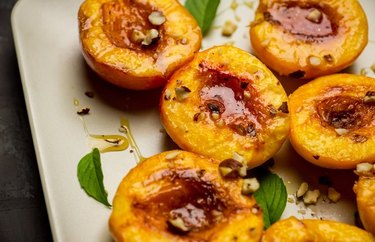
- Calories: 171
Peaches are a good source of vitamin A (providing 16 percent of the daily value) and are a source of beta-carotene, as well as lutein and zeaxanthin. These micronutrients play an important role when it comes to protecting our eyes.
We spend so much time reading from screens — cell phones, computer monitors and the like — that our eyes are exposed to high levels of blue light, as explained by Harvard Health Publishing.
This is a bad thing, especially at night. Being exposed to these blue wavelengths in the later hours of the day can mess with your melatonin and circadian rhythms, making it difficult to fall asleep and hindering the quality of your sleep.
Get the Warm Peaches and Cream recipe and nutrition info here.
3. Strawberry Basil Ice Cream
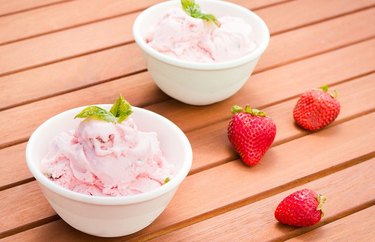
- Calories: 58
Make your own ice cream with just five simple ingredients: strawberries, coconut milk, honey, vanilla extract and basil leaves.
Berries have been linked to a variety of health benefits — but one November 2018 study in Neurology found that they're tied to helping protect our cognitive function as we age.
Harvard researchers reviewed data from more than 28,000 men and found that total fruit, total vegetable and fruit juice intake was associated with lower odds of developing moderate or poor cognitive function. They found an even stronger association with leafy greens, carotenoid-rich vegetables and berries.
Get the Strawberry Basil Ice Cream recipe and nutrition info here.
4. Petite Peach Melba Ricotta Parfait
- Calories: 116
A medium peach provides more than 10 percent of your daily vitamin C needs.
When we eat this antioxidant through foods like oranges, peaches and nectarines, it helps to keep us looking young by reducing cell damage from environmental factors and producing collagen, according to a July 2012 study published in Dermato Endocrinology.
The part-skim ricotta in this recipe adds protein, which is the most satiating macronutrient, as reported by a July 2016 study published in the Annual Review of Nutrition. This parfait makes a great after-dinner snack. It'll help stabilize blood sugars and keep you feeling fuller for longer.
Get the Petite Peach Melba Ricotta Parfait recipe and nutrition info here.
5. Yogurt Granola and Blackberry Parfait Pops
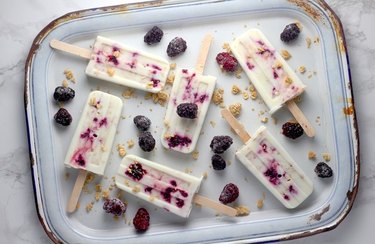
- Calories: 132
These creamy pops are the perfect summertime dessert, but they could pass for breakfast, too. The ingredients include all the makings of a morning meal — blackberries, honey, Greek yogurt, skim milk and low-fat granola.
Blackberries are one of the highest-fiber fruits with more than 7 grams per cup. For comparison, a medium apple has 4 grams. The fiber in blackberries is predominately soluble fiber, which helps to lower cholesterol and maintain stable blood sugar levels, according to the Mayo Clinic.
Get the Yogurt Granola and Blackberry Parfait Pops recipe and nutrition info here.
6. Watermelon Shrub
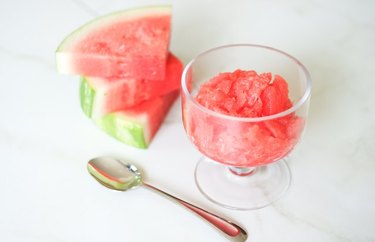
- Calories: 15
We know lycopene is good for us. It's linked to reducing atherosclerosis and other heart diseases, according to an April 2018 review paper published in Food Chemistry.
But, it's often tomatoes that we think of when we hear lycopene. The good news is, sweet watermelon is another source and a viable one at that, according to an older analysis published in June 2003 in The Journal of Nutrition.
The researchers compared the availability of lycopene in 11 different varieties of red-fleshed watermelon to tomato juice and found that the absorption of watermelon juice was comparable to that of tomato juice.
Get the Watermelon Shrub recipe and nutrition info here.
- International Food Information Council Foundation: "Hydration: It’s a Fluid Situation"
- United States Department of Agriculture: "Watermelon Packs a Powerful Lycopene Punch"
- International Food Information Council Foundation: "What is Lycopene?"
- MyFoodData: "Yellow Peaches"
- Harvard Health: "Blue Light has a Dark Side"
- Neurology: "Long-term Intake of Vegetables and Fruits and Subjective Cognitive Function in US Men"
- Dermato Endocrinology: "Discovering the Link Between Nutrition and Skin Aging"
- Annual Review of Nutrition: "The Macronutrients, Appetite, and Energy Intake"
- MyFoodData: "Blackberries"
- MyFoodData: "Apple"
- MyFoodData: "Strawberries"
- Mayo Clinic: "Nutrition and Healthy Eating"
- Food Chemistry: "Can Lycopene be Considered an Effective Protection Against Cardiovascular Disease?"
- The Journal of Nutrition: "Consumption of Watermelon Juice Increases Plasma Concentrations of Lycopene and B-Carotene in Humans"
